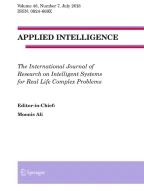Abstract
Task offloading in edge computing has become an effective way to expand the computing power of user equipment, since it migrates computing-intensive applications from user equipment to edge servers. The execution of a task may require multiple services. Today, many works study the edge computing about service placement or migration with single service tasks. However, it may not meet the need of applications on large scale. In this paper, we study a computational offloading method for multi-service tasks. Here, the execution of each task requires the collaboration of multiple services, and each service is indispensable. Specifically, we design an evaluation metric about system cost, and aim to find the decision to minimize this metric to solve the mobile edge computing (MEC) problem with multi-services tasks. Since this problem is NP-hard, we design the multi-service task computing offload algorithm (MTCOA) to realize the optimal solution. The simulation results show that the algorithm can effectively reduce the cost of computing offloading, and it has higher resource utilization than the existing algorithms.
Similar content being viewed by others
Explore related subjects
Discover the latest articles, news and stories from top researchers in related subjects.References
Dehos C, González JL, De Domenico A, Kténas D, Dussopt L (2014) Millimeter-wave access and backhauling: the solution to the exponential data traffic increase in 5g mobile communications systems? IEEE Commun Mag 52(9):88–95
Huynh LNT, Pham QV, Nguyen TD, Hossain MD, Park JH, Huh EN (2020) A study on computation offloading in mec systems using whale optimization algorithm. In: 2020 14th international conference on ubiquitous information management and communication (IMCOM), pp 1–4
Atlam H, Walters R, Wills G (2018) Fog computing and the internet of things: A review. Big Data Cogn Comput 2(2):10
Abbas N, Zhang Y, Taherkordi A, Skeie T (2017) Mobile edge computing: A survey. IEEE Internet Things J PP(99):1–1
Bastug E, Bennis M, Debbah M (2014) Living on the edge The role of proactive caching in 5g wireless networks. IEEE Commun Mag 52(8):82–89
Fan L, Cao P, Almeida J, Broder AZ (2000) Summary cache: A scalable wide-area web cache sharing protocol. IEEE/ACM Trans Networking 8(3):281–293
Satria D, Park D, Jo M (2017) Recovery for overloaded mobile edge computing, Elsevier Science Publishers B. V., New York
Lv H, Zhang T, Zhao Z, Xu J, He T (2020) The development of real-time large data processing platform based on reactive micro-service architecture. In: IEEE 4th information technology, networking electronic and automation control conference (ITNEC), p 2020
Mao Y, You C, Zhang J, Huang K, Letaief KB (2017) A survey on mobile edge computing: The communication perspective. IEEE Commun Surv Tutorials PP(99):1–1
Castellano G, Esposito F, Risso F (2019) A distributed orchestration algorithm for edge computing resources with guarantees. In: IEEE INFOCOM, p 2019
Lyu X, Tian H, Zhang P, Sengul C (2016) Multi-user joint task offloading and resources optimization in proximate clouds. IEEE Trans Veh Technol pp 1–1
Gao B, Zhou Z, Liu F, Xu F (2019) Winning at the starting line Joint network selection and service placement for mobile edge computing. In: IEEE INFOCOM 2019 - IEEE conference on computer communications
Zhang W, Wen Y, Guan K, Kilper D (2013) Energy-optimal mobile cloud computing under stochastic wireless channel. IEEE Trans Wirel Commun 12(9):4569–4581
Wang L, Jiao L, Li J, Mühlhäuser M (2018) Online resource allocation for arbitrary user mobility in distributed edge clouds. In: IEEE international conference on distributed computing systems
Brogi A, Forti S, Guerrero C, Lera I (2019) Meet genetic algorithms in monte carlo Optimised placement of multi-service applications in the fog. In: IEEE international conference on edge computing (EDGE 2019)
Yu X, Neng CW, Gu T, Zhang H, Zhang J (2017) Set-based discrete particle swarm optimization based on decomposition for permutation-based multiobjective combinatorial optimization problems. IEEE Trans Cybern PP(99):1–15
Zhai L, Wang H (2017) Crowdsensing task assignment based on particle swarm optimization in cognitive radio networks. Wirel Commun Mob Comput 2017:1–9
Liu H, Xu B, Lu D, Zhang G (2018) A spath planning approach for crowd evacuation in buildings based on improved artificial bee colony algorithm. Appl Soft Comput pp S1568494618302060
Guo F, Zhang H, Ji H, Li X, Leung VC (2018) An efficient computation offloading management scheme in the densely deployed small cell networks with mobile edge computing. IEEE/ACM Trans Networking 26(6):2651–2664
Jiang C, Li Y, Su J, Chen Q (2021) Research on new edge computing network architecture and task offloading strategy for internet of things. Wirel Netw (2) pp 1–13
Zhou Z, Yu S, Chen W, Chen X (2020) Ce-iot Cost-effective cloud-edge resource provisioning for heterogeneous iot applications. IEEE Internet Things J PP(99):1–1
Pyrih Y, Kaidan M, Tchaikovskyi I, Pleskanka M (2019) Research of genetic algorithms for increasing the efficiency of data routing. In: 2019 3rd international conference on advanced information and communications technologies (AICT)
Li H, Wu H (2016) An oppositional wolf pack algorithm for parameter identification of the chaotic systems. Optik 127(20):9853–9864
Author information
Authors and Affiliations
Corresponding authors
Additional information
Publisher’s note
Springer Nature remains neutral with regard to jurisdictional claims in published maps and institutional affiliations.
Shudian Song and Shuyue Ma contributed equally to this work
Rights and permissions
About this article
Cite this article
Song, S., Ma, S., Zhao, J. et al. Cost-efficient multi-service task offloading scheduling for mobile edge computing. Appl Intell 52, 4028–4040 (2022). https://doi.org/10.1007/s10489-021-02549-2
Accepted:
Published:
Issue Date:
DOI: https://doi.org/10.1007/s10489-021-02549-2
